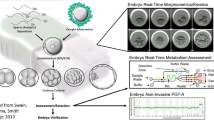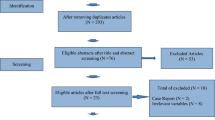Abstract
The purpose of this study was to investigate the influence of antisperm antibodies in the male, the female, or both partners on the outcome of in vitro fertilization treatment. The results in terms of ongoing pregnancies in the male and female antibody-positive group were the same as in the antibody-negative group. In the double antibody-positive group two of the three patients became pregnant. When high levels of antisperm antibodies were present on the spermatozoa, the fertilization rate was significantly reduced. In the female positive group no clear relationship between the antibody titer and the fertilization percentage could be detected. Abnormal semen quality was responsible for a much lower fertilization rate than the presence of antibodies. The conclusion of this study is that in vitro fertilization provides an equal chance of conception in couples with antisperm antibodies in comparison with couples with no antibodies if the other semen parameters are normal.
Similar content being viewed by others
References
Bronson RA, Cooper GW, Rosenfeld DL: Sperm antibodies: Their role in infertility. Fertil Steril 1984;242:171–183
Clarke GN: Sperm antibodies and human fertilization. Am J Reprod Immunol Microbiol 1988;17:65–71
Jones WR: Assessing immunity to sperm. Clin Reprod Fert 1982;1:3–12
Clarke GN, Lopata A, Johnston WI: Effect of sperm antibodies in females on human in vitro fertilization. Fertil Steril 1986;46:435–441
Clarke GN, Hyne RV, du Plessis Y, Johnston WI: Sperm antibodies in human fertilization. Fertil Steril 1988;49:1018–1025
Mandelbaum SL, Diamond MP, DeCherney AH: Relationship of antisperm antibodies to oocyte fertilization in in vitro fertilization-embryo transfer. Fertil Steril 1987;57:644–651
Matson PL, Junk SM, Spittle JW, Yovich YL: Effect of anti-spermatozoa antibodies in seminal plasma upon spermatozoal function. Int J Androl 1988;11:101–106
Clarke GN, Lopata A, McBain JC: Effect of sperm antibodies in males on human in vitro fertilization. Am J Immunol Microbiol 1985;8:62–66
Tzartos SJ: Inhibition of in vitro fertilization of intact and denuded eggs by univalent anti-sperm antibodies. J Reprod Fert 1979;55:447–455
Bronson RA, Cooper GW, Rosenfeld DL: Sperm specific isoantibodies and autoantibodies inhibit the binding of human sperm to the zona pellucida. Fertil Steril 1982;38:724–729
Bronson RA, Cooper GW, Rosenfeld DL: Ability of antibody-bound sperm to penetrate zona free hamster ova in vitro. Fertil Steril 1981;36:778–783
Shulman S, Harlin B, Davis P, Victor Reyniak J: Immune infertility and new approaches to treatment. Fertil Steril 1978;29:309–313
Alexander NJ, Sampson JH, Fulgham DL: Pregnancy rates in patients treated for antisperm antibodies with prednisone. Int J Fertil 1983;28:63–67
Palermo GH, Devroey P, Camus M, Kahn I, Wisanto A, van Steyrteghem A: Assisted procreation in the presence of a positive direct mixed antiglobulin reaction test. Fertil Steril 1989;52:645–649
Elder KT, Wick KL, Edwards RG: Seminal plasma antisperm antibodies: The effect of semen sample collection into 50% serum. Hum Reprod 1990;5:179–184
Vasquez-Levin M, Kaplan P, Guzman I, Grunfeld L, Garisi G, Navot D: The effect of female antisperm antibodies in in vitro fertilization, early development and pregnancy outcome. Fertil Steril 1991;56:84–88
WHO: WHO Laboratory Manual for the Examination of Human Semen and Semen-Cervical Mucus Interaction. Cambridge, Cambridge University Press, 1987
Forster MS, Smith WD, Lee WI, Berger RE, Karp LE, Stenchever MA: Selection of human spermatozoa according to their relative motility and their interaction with zona-free hamster eggs. Fertil Steril 1983;40:655–660
Friberg J: A simple and sensitive micromethod for demonstration of sperm agglutinating activity in serum from infertile men and women. Acta Obstet Gynec Scand Suppl 1974;36:21–29
Quinn P, Kerin JF, Warnes GM: Improved pregnancy rate in human in vitro fertilization with the use of a medium based on composition of human tubal fluid. Fertil Steril 1985;44:493–498
Mahony MC, Alexander NJ: Sites of antisperm antibody action. Hum Reprod 1991;10:1426–1430
De Almeida M, Herry M, Testart J, Belaisch-Allart J, Frydman R, Jouannet P: In-vitro fertilization results from thirteen women with anti-sperm antibodies. Hum Reprod 1987;7:599–602
Author information
Authors and Affiliations
Rights and permissions
About this article
Cite this article
Janssen, H.J.G., Bastiaans, B.A., Goverde, H.J.M. et al. Antisperm antibodies and in vitro fertilization. J Assist Reprod Genet 9, 345–349 (1992). https://doi.org/10.1007/BF01203957
Received:
Accepted:
Issue Date:
DOI: https://doi.org/10.1007/BF01203957




